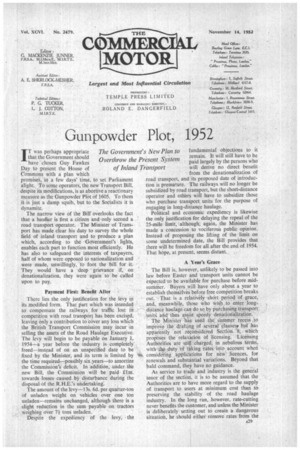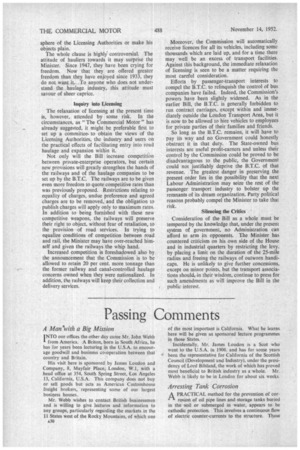Gunpowder Plot
Page 31

Page 32

If you've noticed an error in this article please click here to report it so we can fix it.
IT was perhaps appropriate that the Government should , have chosen Guy Fawkes Day to present the House of Commons with a plan which promises, in a few days' time, to set Parliament alight. To some operators, the new Transport Bill, despite its modifications, is as abortive a reactionary measure as the Gunpowder Plot of 1605. To them it is just a damp squib, but to the Socialists it is dynamite.
The narrow view of the Bill overlooks the fact that a haulier is first a citizen andronly second a road transport operator. The Minister of Transport has made clear his duty to survey the whole field of inland transport and to produce a plan which, according to the Government's lights, enables each part to function most efficiently. He has also to safeguard the interests of taxpayers, half of whom were opposed to nationalization and were made, unwillingly, to foot the bill for it. They would have a deep grievance if, on denationalization, they were again to be -called upon to pay.
Payment First: Benefit After There lies the only justification for the levy in its modified form. That Part which was intended to compensate the railways for traffic lost in competition with road transport has been excised, leaving Only a contribution to cover any loss which the British Transport Commission may incur in selling the assets of the Road Haulage Executive. The levy will begin to be payable on January 1, 1954—a year before the industry is completely freed—instead of on an unspecified date to be fixed by the Minister, and its term is limited by the time required—possibly six-years—to amortize the Commission's deficit. In addition, -under the new Bill, the Commission will be paid Elm. towards -lossescaused by disturbance during the disposal of the R.H.E.'s undertaking. .
The amount of the levy-13s. 6d. per quarter-ton of unladen weight on vehicles over one ton unladen—remains unchanged, although there is a slight reduction in the sum payable on tractors weighing over 7+ tons unladen. "
Despite the expediency of the levy, the fundamental objections to it remain. It will still have to be paid largely by the persons who will derive no direct benefit from the denationalization of road transport, and its proposed date of introduction is prernat.ure. The railways will no longer be subsidized by road transport, but the short-distance operator and others will have to subsidize those who purchase transport units for the purpose of engaging in long-distance haulage. Political and economic expediency is likewise the only justification for delaying the repeal of the 25-mile limit, although; again, the Minister has made a concession to vociferouS public opinion. Instead of proposing the lifting of the limit on some undetermined date, the Bill provides that there will be freedom for all after the end of 1954. That hope, at present. seems distant.
of Inland Transport •
A Year's Grace The Bill is, however, unlikely to be passed into law before Easter and transport units cannot be expectedto be available for purchase before midsunnier. Buyers will have only about a year to establish themielves before free competition breaks out. That is a relatively • shOrt period of grace, and, meanwhile, those Who wish to enter longdistance haulage can do.so by purchasing transport units and thus assist speedy denationalization. The Minister has Used the Simmer recess to improve the drafting of • several clauses, but has apparently not reconsidered Section--8, which propOSes the relaxation Of licensing. Licensing Authorities are :still 'charged, in nebulous terms, with the duty Of taking rates -Into account when considering applicaticins for new' licences, for renewals and substantial Variations. Beyond that bald command, they have no guidance.
As service to trade and industry is the general tenor of the section, it is to be assumed that the Authorities are to have more regard to the supply of transport to users at minimum cost than to preserving the stability of the road haulage industry. In the long run, however, rate-cutting never benefits the customer, and unless the Minister is deliberately setting out to create a dangerous Situation, he should either remove. rates from the sphere of the Licensing Authorities or make his objects plain. The whole clause is highly. controversial. The attitude of hauliers towards it may surprise the Minister. Since 1947, they have been crying for freedom. Now that they are offered greater freedom than they have enjoyed since 1933, they do not want it. To anyone who does not understand the haulage industry, this attitude must savour of sheer caprice.
Inquiry into Licensing The relaxation of licensing at the present time is, however, attended by some risk. In the circumstances, as "The Commercial Motor" has already suggested, it might be preferable first to set up a committee. to obtain the views of the Licensing Authorities, the industry and users on the practical effects of facilitating entry into road haulage and expansion within it.
Not only will the Bill increase competition between private-enterprise operators, but certain new provisions will greatly strengthen the hands of the railways and of the haulage companies to be set up by the B.T.C. The railways are to be given even more freedom to quote competitive rates than was previously proposed. Restrictions relating to equality of charges, undue preference and agreed charges are to be removed, and the obligation to publish charges will apply only to maximum rates. In addition to being furnished with these new competitive weapons, the railways will preserve their right to object, without fear of retaliation, to the provision of road services. In trying to equalize conditions of competition between road and rail, the Minister may have over-reached himself and given the railways the whip hand.
Increased competition is foreshadowed also by the announcement that the Commission is to be allowed to retain 20 per cent, more tonnage than the former railway and canal-controlled haulage concerns owned when they were nationalized. In addition, the railways will keep their collection and delivery services. Moreover, the Commission will automatically receive licences for all its vehicles, including some thousands which are laid up, and for a time there may well be an excess of transport facilities. Against this background, the immediate relaxation of licensing is seen to be a matter requiring the most careful consideration.
Efforts by passenger-transport interests to compel the B.T.C. to relinquish the control of bus companies have failed. Indeed, the Commission's powers have been slightly widened. As in the earlier Bill, the B.T.C. is generally forbidden to run contract carriages, except within and immediately outside the London Transport Area, but it is now to be allowed to hire vehicles to employees for private parties of their families and friends. So long as the B.T.C. remains, it will have to pay its way and no Government could honestly obstruct it in that duty. The State-owned bus interests are useful profit-earners and unless their control by the Commission could be proved to be disadvantageous to the public, the Government could not justifiably deprive the B.T.C. of that revenue. The greatest danger in preserving the present order lies in the possibility that the next Labour Administration may seize the rest of the passenger transport industry to bolster up the remnants of its dream organization. Party political reasons probably compel the Minister to take that risk.
Silencing the Critics ' Consideration of the Bill as a whole must be tempered by the knowledge that, under the present system of government, no Administration can afford to arm its opponents. The Minister has countered criticism on his own side of the House and in industrial quarters by restricting the levy. by placing a limit on the duration of the 25-mile radius and freeing the railways of outworn handi caps. He is unlikely to give further concessions, except on minor points, but the transport associa tions should, in their wisdom, continue to press for such amendments as will improve the Bill in the public interest.




























































































